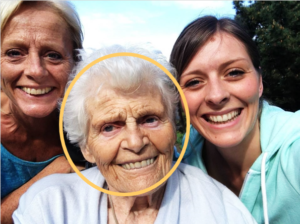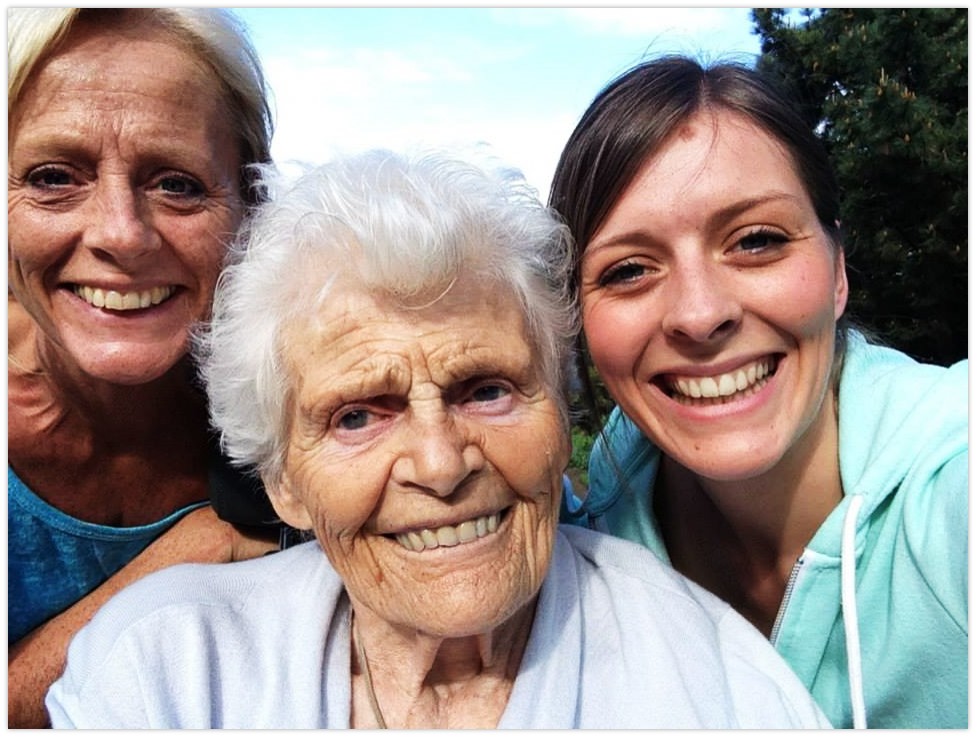Last week, Elizabeth was invited down to St Andrews House to present her PhD work to the Health and Social Care Analysis team. Specifically, this presentation covered her PhD research on the provision of long term care to older adults in Scotland, with a particular focus on the usefulness of Scotland’s administrative data (data that are collected routinely as part of service provision) in answering her PhD questions. In this post, Elizabeth gives you a quick overview of her presentation.
Author: Elizabeth Lemmon
You might be wondering why there is a photograph of me (top right), my mum (top left) and my grandmother (centre) at the top of this post. As well as showing the increasingly familiar image of a multi-generational family (my mum might prefer if there was another generation in there but I have told her she is going to have to wait a few years for that!), I like to use this photograph to tell the story of my PhD. So here goes….
Paper 1: Variations in domiciliary free personal care across Scottish local authorities 
Data used: Social Care Survey (SCS) and other publically available, area level data sets
This paper looks at things from my Grandmother’s perspective as an older person who is receiving personal care services. In particular, it explores variation in the provision of Free Personal Care (FPC) across Scottish local authorities, in order to establish whether or not FPC provision matches the need of the population.
 Paper 2: Utilisation of personal care services in Scotland: the influence of unpaid carers
Paper 2: Utilisation of personal care services in Scotland: the influence of unpaid carers
Data used: Social Care Survey (SCS)
This paper looks at things from my mum’s perspective as an unpaid carer who is providing care to my Grandmother. In particular, this paper uses the SCS to try and understand how unpaid carers can influence older people’s use of personal care services.
Paper 3: The cost of unpaid care: a standard of living approach
Data used: Family Resource Survey (FRS)
My final paper looks at this from my perspective, as an onlooker to the caring situation going on between my mum and my Grandmother. This perspective asks, “who cares for the carer?”. The aim of this paper was to understand whether or not unpaid carers experience a reduction in their standard of living due to caring, if so then how much would they need to be compensated by in order for them to reach the same standard of living as a non-carer, and finally how would that level of compensation compare to the current Carers Allowance.
If you want to know what I actually did and found in each of these three papers, you can have a look at my thesis here.
My PhD and Administrative Data
I had planned to use a national, linked administrative health and social care data set for my PhD. In fact, I applied for this in April 2016. Unfortunately, I didn’t get access to it until April 2018 and by this point I had had to come up with a plan B and was running out of time/funding to be able to get to grips with the linked data.
As a result, I made do with publically available, geographical level data, survey data and administrative social care data.
Did the administrative data help? Some reflections…
Well yes, of course they did. I was able to do some pretty cool work in my PhD using the SCS and this wouldn’t have been possible without it. However, the PhD really taught me that the administrative data struggle is real! A few things I highlighted in the presentation to the Scottish Government were:
- Approvals process and linkage timing. Two years is simply too long in the lifetime of a PhD and I did not foresee that it would take this long.
- Administrative data aren’t designed for research- they typically lack important controls that we really want/need in econometric analysis. But if we want to answer policy relevant questions with administrative data, surely they should be designed with this in mind? See this recent blog post I did with my colleague from Napier for the Office of Statistical Regulation.
- There were lots of differences between local authorities in terms of data recording, missing information etc, which can cast doubt on the conclusions (of course I have carried out as many sensitivity and robustness checks to ensure this isn’t the case, but there is still doubt).
- There isn’t any information about the unpaid carers in the SCS. Again, this is important information that is lacking from the administrative data.
Sadly, I’m still enduring this administrative data struggle in my role here in Edinburgh Health Economics. In an attempt to do something about this, I have spent some time developing a new platform called Early Career Researchers Using Scottish Administrative Data (eCRUSADers). I’m hoping that this will reduce the struggle for any researchers who are new to the administrative data scene. You can find out more about eCRUSADers (or join us?!) on the website here.




